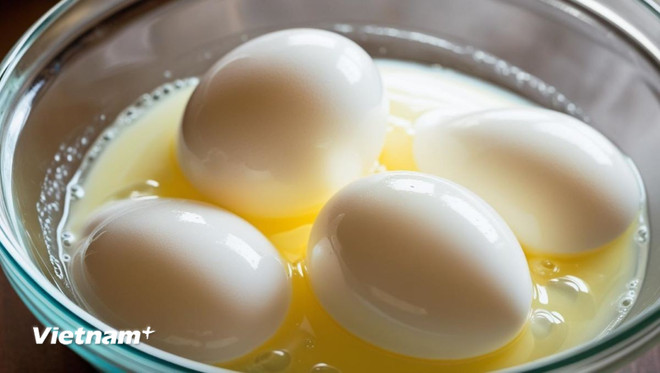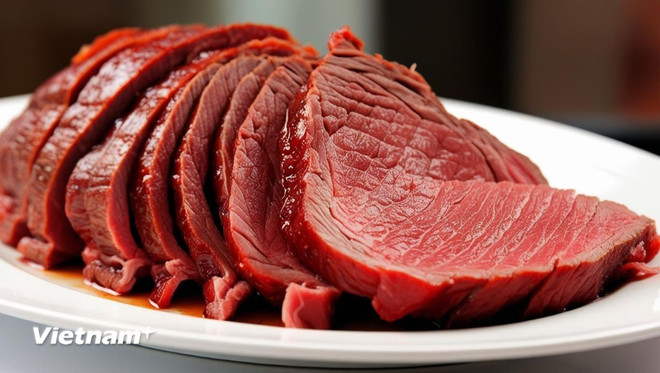It has long been a popular belief that people with hyperlipidemia (or high blood fat) should avoid consuming foods high in cholesterol.
However, there are some foods that are high in cholesterol and can still be part of a healthy diet.
Understanding the nature of each of these foods can help patients optimize their nutrition without having to completely eliminate them from their daily menu.
In particular, these are foods that people with hyperlipidemia may be surprised to discover that they do not necessarily have to be eliminated from the menu if they still want to maintain a heart-healthy diet to control blood cholesterol levels more effectively.
Egg
According to research, consuming one egg per day is considered safe for most people. For obese people, the advice is to eat a maximum of 6 eggs per week, only one at a time, because the amount of cholesterol in an egg is suitable for the amount of cholesterol the body is allowed to consume each day.
For people with high cholesterol, it is recommended to remove the yolk and only eat the egg white because most of the cholesterol is concentrated in the yolk. In particular, if you have diabetes with high cholesterol, you should only consume less than 3 eggs per week to ensure your health.
The best time to eat eggs is in the morning or afternoon, avoid eating them in the evening. Moreover, eggs should not be combined with foods such as butter, cheese, bacon, sausage, or pastries, as they can increase blood cholesterol levels.
People with high blood fat should limit eating eggs with refined starches such as white bread, cakes or potatoes, because these foods can easily increase the risk of cardiovascular disease.
Instead, you can combine eggs with fresh vegetables, herbs, spices, paprika, or serve with whole-grain bread. Additionally, soft margarine, which is low in saturated fat and trans fat, is also a safe alternative.

Cheese
Cheese, although high in saturated fat, is an excellent source of calcium, biotin and peptides, all of which contribute to heart health.
Replacing butter with cheese can help lower LDL, the bad cholesterol, even though both contain saturated fat.
Some cheeses and milks have a fat content of 1-2%, along with less sodium, which is good for heart health and suitable for people with high cholesterol. These products should be used daily to aid digestion and avoid taking in too much fat into the body.

Lean beef
It has long been a common belief that red meat is bad for heart health because it contains saturated fat that can raise cholesterol.
However, researchers have found that maintaining healthy blood cholesterol levels is entirely possible when consuming a diet rich in vegetables, fruits, whole grains, nuts and beans, with lean beef used as a major source of protein.
Some studies also show that a Mediterranean-style diet that incorporates lean beef may help reduce bad cholesterol levels in the body.
In particular, for people with high blood fat levels, beef can be included in the daily menu if lean meat is chosen and appropriate portions are followed, with each portion not exceeding 85g.
A love of beef need not be a barrier to heart health if you combine it wisely with a diet rich in vegetables, fruits, whole grains, nuts and beans. This balanced approach not only helps maintain healthy cholesterol levels but also effectively reduces bad cholesterol.

Shrimp
Although shrimp is relatively high in cholesterol, it is free of saturated fat. Especially when steamed rather than fried or cooked with lots of butter, shrimp can be part of a heart-healthy diet.
According to the American Heart Association, shrimp is a food that people can use to support balanced cholesterol levels.
So if you're trying to manage your cholesterol, try incorporating shrimp into sensible meals, such as stir-fried vegetables with rich spices and herbs or drizzling olive oil over a fresh salad.

What should be noted when preparing a diet for people with high blood fat?
When preparing a diet for people with high blood fat, it is important to note the following:
- Limit foods containing saturated fat and trans fat.
- Prioritize choosing foods rich in soluble fiber such as fruits, fresh vegetables, whole grains...
- Use healthy oils when cooking.
- Can eat one vegetarian meal per week.
- Control the amount of sugar and refined starch in your diet.
- Limit salt intake and prioritize cooking methods such as steaming, boiling, and stir-frying with little oil.
- Control calorie intake to maintain a healthy weight.
- Alcohol consumption should be limited or completely eliminated, especially for people with cardiovascular disease or high blood pressure.
- Maintain a regular exercise routine or participate in light sports activities such as walking, badminton, swimming, or aerobics./.
Source: https://www.vietnamplus.vn/4-thuc-pham-giau-cholesterol-nhung-van-tot-cho-nguoi-bi-mo-mau-post1035333.vnp


































































































Comment (0)